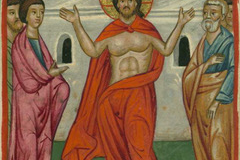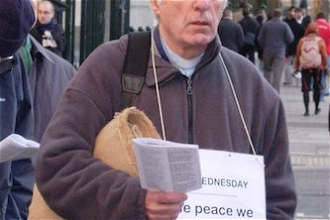Lord Alton reports on Darfur
While the international community procrastinated last week about whether events in Darfur constitute genocide, I visited the Ardamata refugee camp in Geneina, where 30,000 people are sheltering. Tribal leaders there testified to a campaign of killing, rape, burning and looting by the Janjaweed militias which have killed an estimated 70,000 people and displaced 1.4 million others. Three months ago, the UN described the situation in Darfur as "the world's worst humanitarian crisis". On my two-day visit, I found that nothing much has changed. The government of Sudan has reneged on its promise to disarm the Janjaweed. Their campaign has the sole objective of eradicating the black tribes and installing the Arabs in their place. If this isn't genocide, then it's difficult to imagine what on earth is. I have sent a full report to Tony Blair and will ask a question about Darfur in the House of Lords today. My report is a catalogue of systematic violence driven by ethnic hatred and aided by the Sudanese regime. We heard first-hand accounts of the rape of girls as young as 10 and women as old as 80. Men wept as they recounted the humiliations and killings. The report is on the website of the human rights group the Jubilee Campaign, which arranged the visit (www.jubileecampaign.co.uk). We joined a group of 17 women sitting in the shade of a tree, drinking coffee. Most were widows, and most had also lost fathers, brothers and sons. They need firewood for cooking and grass for their animals, and are thus forced to go beyond the camp. They had all, without exception, been the victims of attack and rape by the Janjaweed. Although they are clearly traumatised by the daily risks they run, they speak philosophically about it: "If our men go out, they die. If we go, we are raped. That's the choice." Hawry, 35, told us that when her village was attacked, the men "harassed and beat" the women and girls before they rode off. These are euphemisms for rape; in their society, it is an unmentionable subject, bringing shame and humiliation on the victim and her family. We were told that the "Arabs" carried razor blades and sharp knives to cut open the atrophied vaginas of old women before they raped them. When the Janjaweed had gone, Hawry said, the women abandoned the village. "My family once had 88 head of cattle, but I put one baby around my neck and another child on my back, and I started walking." Her other three children had to walk for the next eight days. An immeasurable problem will be the impact of so many babies born due to rape. While the women eventually opened up about the attacks by the militias, they would not even discuss what the future holds for the children. "They want to dilute our blood," one woman said. "They hate black people." A traumatised, helpless mood of resignation simmers in the camps. Sometimes it boils over, as, for instance, at Otash camp, near Nyala, where a policeman was lynched. A woman had recognised him as one of those who massacred her family I understand why Tony Blair wanted face-to-face discussions with President Omar al-Bashir when he visited Khartoum this month. But before we shake too many hands in Sudan we should remember the blood on them. Britain refuses to follow America's lead in saying that what is happening in Darfur is genocide. The Government's line is that it would not help it in its efforts to put pressure on the Sudanese Government. Yet Britain is one of 135 signatories to the 1949 Geneva Convention Against Genocide. This is not merely declamatory, it places a duty on the signatories to "prevent and protect" and subsequently to prosecute and to bring to justice those who commit crimes against humanity. My visit to Africa also included Rwanda where, 10 years ago, 800,000 people died in 100 days as the international community looked on. I left Darfur fearing that we are sleepwalking into another Rwanda. There are no UN troops in Darfur - just a handful of African Union soldiers to protect the monitors. Poignantly, the first country to send troops was Rwanda. The country's President, Paul Kagame, told me that they decided to do this because they can see the parallels with what happened to them. The terrified tribal leaders that we met in Darfur believe that the mere presence of monitors and international non-governmental organisations will prevent incursions by the Janjaweed. Rwanda illustrates the dangers of such illusions. Over one million people have been herded into camps run by the Government. Some of the officers who patrol the camps are Janjaweed militiamen in police uniforms. The elders said that security remains their greatest concern. They called for the disarmament of the Janjaweed; the restoration of looted livestock; the return or rebuilding of property; a resolution of the land issue and freedom to move about. Above all, they told us, the genocide must end. One, Sheik De Allah, said poignantly: "We are a simple people. We know our farms and cattle and that's all we want. The Government created Janjaweed and has created this situation. We are desperate and pray that the international community will intervene." Lord Alton of Liverpool is an independent crossbench peer and a founder of the Jubilee Campaign. Source: Lord Alton/Jubilee Action


















